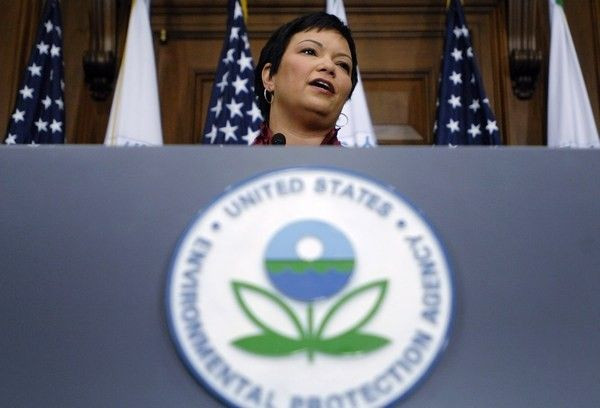In Fighting Goliath EPA, Family Gets Support from Corporate Giants

The Sackett's fight against the Environmental Protection Agency, a bugaboo in conservative politics, has been cast as a David versus Goliath battle that will be decided by the U.S. Supreme Court.
The case justices heard on Monday involves a family who bought in 2005 a plot of land two-thirds of an acre in Priest Lake, Idaho. They wanted to build their dream home on the plot, but were thwarted by the EPA, which had told them that they would be building on protected wetland.
The agency, in a move that has given conservatives another reason to dismantle the EPA, slapped the Sacketts with a Clean Water Act violation. The Sacketts unsuccessfully tried to legally challenge the EPA's order, which told them that they would have to remove gravel for the foundation from the property and restore the wetland in the face of a $37,500-a-day fine for noncompliance.
Unlike other regulations and enforcement orders, the EPA under clean air and water laws can issue an order without giving the recipient a chance to challenge it in court before the agency initiates a lawsuit for noncomplience. The Sacketts asked the justices to determine if they can lodge a pre-enforcement challenge to an EPA order and, if not, whether their due process rights are being violated.
Corporations Back Sacketts
That issue, argued before the Supreme Court Monday, is the reason why the Sacketts have gotten support from corporate giants--General Electric (GE) and trade groups representing oil, agriculture and manufacturing industries have filed court briefs on the family's behalf--in their fight against the Goliath EPA.
If the justices decide to open the door for pre-enforcement challenges to EPA orders, companies can spend massive amounts of money on fighting EPA enforcement in court. GE failed to get the pre-enforcement challenge issue before the Supreme Court in its case against the EPA's administrator.
The EPA and environmental groups claim ... this will substantially frustrate enforcement of environmental laws, said Dave Buente, a Sidley Austin partner who represents companies facing EPA enforcement. [Businesses argue], 'Well, you shouldn't be issuing orders that cannot withstand judicial scrutiny.'
GE, in a friend-of-the-court brief, urged the Supreme Court justices to avoid reaching a narrow decision tailored to the case before them and go big.
The questions presented by this case have broad implications beyond the parties involved, GE wrote, adding that the court should hold that unilateral orders from the EPA requires the government to provide due process hearings prior to issuing such orders or... promptly afterwards.
Court Brief from American Petroleum Institute
The Sacketts' position was also defended in court briefs from the American Petroleum Institute, which argued in favor of allowing challenges to the EPA's jurisdiction; and the American Farm Bureau Federation, which said the EPA subjects landowners to a constitutionally intolerable choice of submitting to an order, risking noncompliance fines or seeking a permit.
The National Resources Defense Council, in support of the EPA, said the corporations and trade groups are using the Sacketts' case to hamstring the EPA, noting that the facts behind the Sacketts' situation undercut the motherhood-and-apple-pie case of an ordinary family who just want to build their dream house.
If the court rules in favor of the Sacketts and these industry giants, the agency will have a much harder time stopping environmental harm--things like dumping toxic chemicals into rivers, as well as burying wetlands and other sensitive areas, Larry Levine, a senior NRDC attorney, wrote in a Friday blog post.
The EPA, contended the order against the Sacketts was merely a communication to let them know they violated the Clean Water Act and that they faced fines for failing to remedy the problem. To actually enforce the order and hit alleged violators with fines, the agency must convince a judge. This is when a party like the Sacketts can lodge a legal defense, the EPA explained in court documents.
The EPA did acknowledge that the Sacketts faced an unenviable choice between complying with the order or risk losing an expensive court battle with the agency.
Lawyers call this the horns of a dilemma, Buente, a former chief of environmental enforcement at the Department of Justice, told the International Business Times.
--
© Copyright IBTimes 2025. All rights reserved.





















